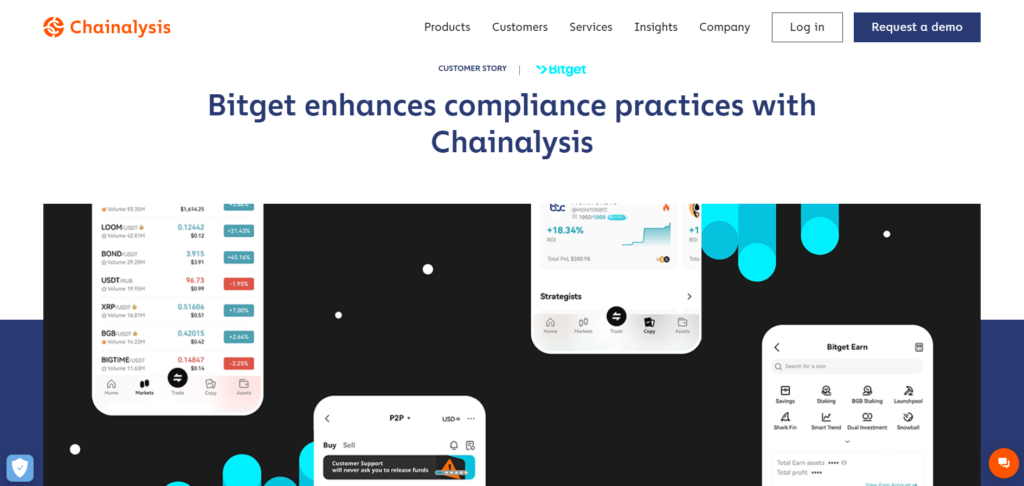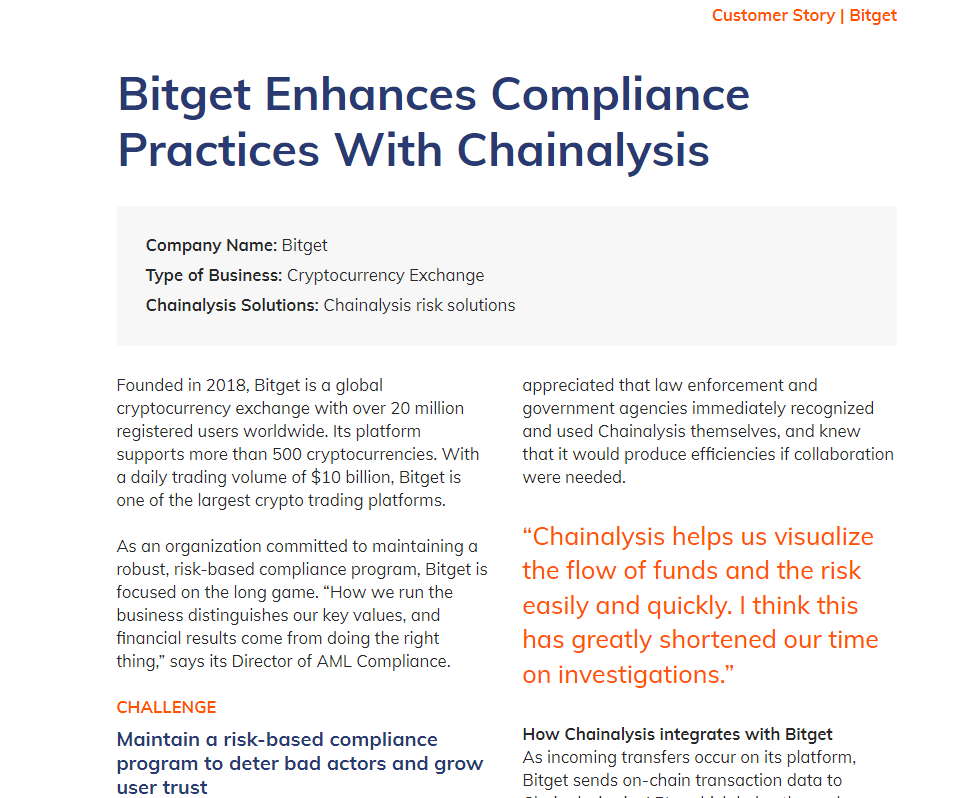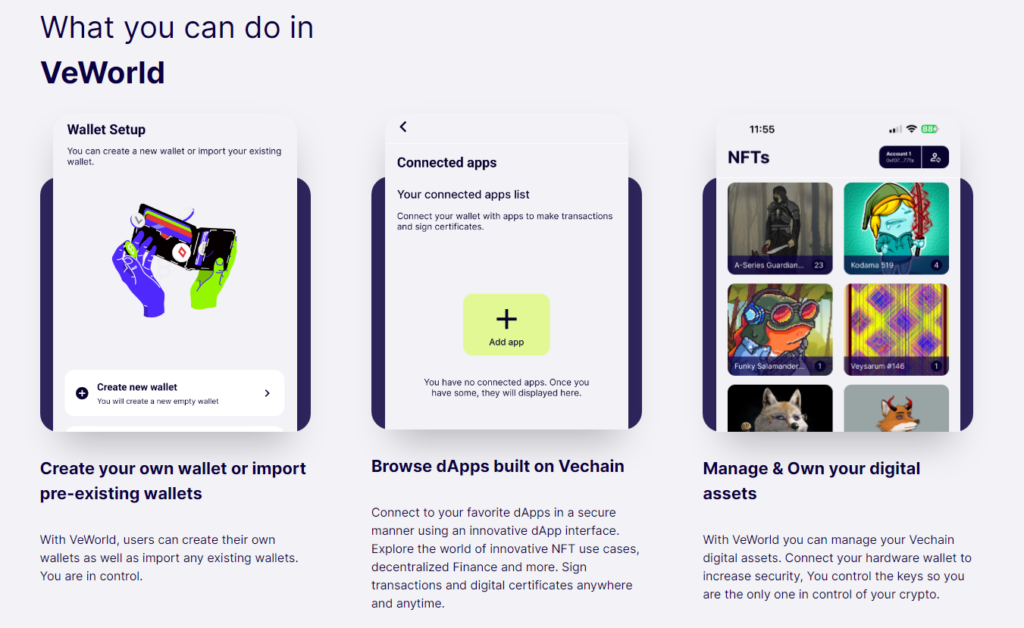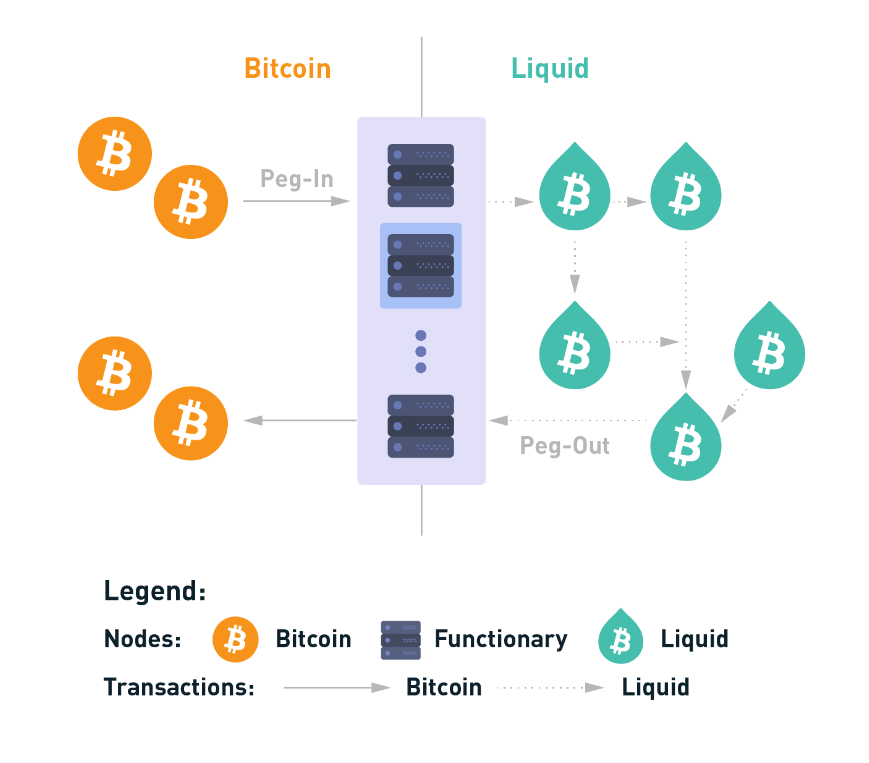Introduction: Exploring the Innovative World of Blockchain Companies
In the dynamic and evolving landscape of blockchain companies, a new era of technological innovation is unfolding. These enterprises are not just reshaping the financial sector; they’re revolutionizing how we approach everything from supply chain management to digital identity verification. This blog post delves into the remarkable journeys and contributions of some of the most prominent blockchain companies, including Coinbase, Binance, Ripple, Block.one, ConsenSys, IBM Blockchain, Chainalysis, VeChain, and Blockstream.
Our exploration will uncover how these companies are harnessing the power of blockchain technology to create transformative solutions across various industries. From enhancing global financial transactions to ensuring product authenticity, their impact is widespread and significant. As we navigate through each of these blockchain companies, we gain insight into the future potential and current realities of blockchain technology—a domain that is continually redefining the boundaries of digital innovation and security.
Table of Contents
Coinbase: A Leader in the Blockchain Companies Arena
Coinbase, one of the most prominent names among blockchain companies, stands as a testament to the revolutionary impact of blockchain technology in the financial world. Founded in 2012, Coinbase has rapidly evolved from a simple Bitcoin exchange to a comprehensive platform that offers a wide range of services in the cryptocurrency space.

Background and Core Business
Coinbase’s journey began with a mission to make cryptocurrency accessible to everyone, everywhere. It has since developed into a platform where users can buy, sell, store, and exchange various cryptocurrencies including Bitcoin, Ethereum, and Litecoin, among others. The company’s user-friendly interface makes it a favorite, particularly for those new to the world of digital currencies. Coinbase has been instrumental in bringing cryptocurrencies into mainstream financial conversations.

Impact on the Blockchain and Cryptocurrency Market
As one of the leading blockchain companies, Coinbase’s influence extends beyond just being a cryptocurrency exchange. It has played a pivotal role in shaping regulatory conversations around cryptocurrencies, striving for a balance between innovation and consumer protection. Coinbase’s listing of new cryptocurrencies often leads to increased market attention and valuation for these currencies, a phenomenon sometimes referred to as the “Coinbase Effect.”
Innovations and Contributions
Coinbase has continually innovated to stay at the forefront of the blockchain industry. This includes the launch of Coinbase Pro for professional traders, offering advanced trading features, and more recently, the integration of decentralized finance (DeFi) applications. These efforts not only expand the company’s offerings but also reinforce its position as a leader among blockchain companies.
Coinbase’s role as a trailblazer among blockchain companies is undeniable. Its continuous efforts to innovate and democratize access to cryptocurrencies have positioned it as a key player in the blockchain industry. By making the complex world of digital currencies accessible and understandable, Coinbase is not just a company; it’s a driving force in the ongoing financial revolution brought about by blockchain technology.
Binance: A Dynamic Force Among Blockchain Companies
Binance has rapidly emerged as a major powerhouse in the realm of blockchain companies, distinguishing itself through its expansive operations in the cryptocurrency trading sector. Since its inception in 2017, Binance has grown exponentially, offering a compelling testament to the vibrant potential of blockchain technology.
Company’s Rise to Prominence
Binance’s journey is a remarkable story of rapid growth and adaptation in the volatile world of cryptocurrencies. Founded by Changpeng Zhao, commonly known as “CZ,” Binance quickly rose to prominence due to its vast array of offerings and a strong emphasis on user security and interface efficiency. The platform’s ability to handle a massive number of transactions while maintaining minimal transaction fees has been central to its success and appeal among users.

Services and Global Reach
As a leading name among blockchain companies, Binance has expanded well beyond its initial role as a cryptocurrency exchange. It now includes services such as Binance Coin (BNB), a native cryptocurrency, Binance Smart Chain for hosting decentralized applications, and Binance Academy for blockchain and crypto education. Its global reach is evident in its diverse user base and the multitude of languages supported by the platform.
Contributions to Blockchain Technology and Community
Binance’s contributions to the blockchain sector are multifaceted. It has played a pivotal role in popularizing cryptocurrency trading on a global scale. Furthermore, through initiatives like Binance Labs and Binance Charity, the company has fostered innovation and social good, aligning with the decentralized and communal ethos of the blockchain community.

Binance’s evolution and its significant role in the blockchain space exemplify the dynamic and transformative nature of blockchain companies. Its commitment to innovation, security, and community-building continues to shape the landscape of cryptocurrency trading and blockchain technology adoption worldwide.
Ripple: Revolutionizing Payments in Blockchain Companies
Ripple, distinct among blockchain companies, has carved a niche for itself by focusing on real-time, cross-border payment systems. Founded in 2012, Ripple aims to transform the world of financial transactions through its innovative use of blockchain technology.

Ripple’s Approach to Blockchain and RippleNet
Unlike many blockchain companies that focus on the broader application of blockchain technology or cryptocurrency offerings, Ripple specializes in the financial industry. It uses its digital payment protocol, RippleNet, to facilitate instant, low-cost international transactions. RippleNet operates differently from typical blockchain technologies: it uses a unique consensus protocol to validate transactions, which significantly speeds up transaction times and reduces costs.
Role in International Banking and Payment Systems
Ripple’s impact in the financial sector is noteworthy. With RippleNet, the company has partnered with various banks and financial institutions worldwide to streamline their payment systems. This network enables secure, instant, and nearly free global financial transactions of any size with no chargebacks. Ripple’s technology is thus seen as a potential game-changer for international banking and remittances.

Key Partnerships and Milestones
Ripple has formed strategic alliances with several major financial institutions, such as Santander, Axis Bank, and American Express. These partnerships underscore Ripple’s commitment to integrating blockchain technology into traditional financial frameworks. Additionally, the development of XRP, Ripple’s native cryptocurrency, has garnered significant attention, further cementing Ripple’s position among leading blockchain companies.
Ripple stands out among blockchain companies for its specialized approach and significant advancements in the financial sector. Its continual innovation in blockchain-based payment solutions offers promising prospects for the future of international transactions and financial connectivity.
Block.one (EOS.IO): Innovating in the Realm of Blockchain Companies
Block.one, the company behind the high-performance blockchain platform EOS.IO, represents a significant evolutionary step among blockchain companies. Founded in 2017, Block.one has made a substantial impact with EOS.IO, focusing on scalability, user experience, and developer-friendly environments.

Introduction to Block.one and EOS.IO Platform
Block.one is distinguished in the blockchain industry for launching EOS.IO, a blockchain platform designed for both public and private use cases. EOS.IO is notable for its high transaction throughput, low latency, and flexible utility. Unlike traditional blockchain platforms that rely on proof-of-work (PoW) consensus mechanisms, EOS.IO utilizes a unique delegated proof-of-stake (DPoS) model. This model not only enhances transaction speeds but also reduces the environmental impact, a critical concern in blockchain technology.

Performance and Scalability Features
One of EOS.IO’s major draws is its exceptional scalability, capable of processing thousands of transactions per second (TPS) with potential for more. This scalability addresses a common bottleneck in blockchain infrastructure and opens the door for mainstream blockchain adoption across various industries. The platform’s emphasis on removing transaction fees and providing a user-friendly experience further sets it apart from other blockchain companies.
Contributions to Decentralized Application (DApp) Development
Block.one’s EOS.IO platform has become a hub for decentralized application (DApp) development. By offering robust support for developers, including comprehensive documentation and a supportive community, EOS.IO has facilitated the creation of a wide range of DApps. These applications span various sectors, including finance, social media, and gaming, showcasing the platform’s versatility and developer-friendly nature.

Source: Steemit
Block.one, through its EOS.IO platform, is redefining what is possible in the blockchain space. Its commitment to scalability, environmental consciousness, and a developer-friendly ecosystem positions it as a vanguard among blockchain companies, paving the way for broader adoption and innovative uses of blockchain technology.
ConsenSys: Driving Innovation Among Blockchain Companies
ConsenSys, a fundamental pillar in the landscape of blockchain companies, has been instrumental in the development and growth of the Ethereum ecosystem. Founded in 2014 by Joseph Lubin, a co-founder of Ethereum, ConsenSys has positioned itself as a leading technology company that develops decentralized software and applications on the Ethereum blockchain.

Background and Relationship with Ethereum
ConsenSys was established with the vision of building and expanding the capabilities of Ethereum, the world’s leading programmable blockchain. The company focuses on leveraging Ethereum’s technology to enable a new generation of applications and services. ConsenSys plays a crucial role in popularizing and improving Ethereum, making it more accessible and useful for developers and businesses.
Projects and Initiatives
The range of projects and initiatives undertaken by ConsenSys is a testament to its commitment to innovation in the blockchain space. From developing infrastructure software and decentralized applications (DApps) to venture funding and blockchain education initiatives, ConsenSys is at the forefront of driving the Ethereum ecosystem forward. Some notable projects include MetaMask, a widely-used Ethereum wallet and gateway to blockchain apps, and Infura, a scalable API for Ethereum and IPFS networks.

Role in Promoting Ethereum and Blockchain Education
Education is a key aspect of ConsenSys’ mission. The company has made significant efforts to educate the public and developers about Ethereum and blockchain technology. Through educational platforms and community outreach programs, ConsenSys has been pivotal in cultivating a knowledgeable and skilled blockchain community. This commitment to education not only strengthens Ethereum’s position but also propels the entire blockchain industry forward.

ConsenSys stands out among blockchain companies for its comprehensive involvement in the Ethereum ecosystem. Through its innovative projects, educational initiatives, and continuous support for Ethereum’s growth and development, ConsenSys plays a pivotal role in shaping the future of blockchain technology.
IBM Blockchain: Pioneering Corporate Blockchain Solutions
IBM Blockchain has emerged as a leader among blockchain companies, especially in the corporate sector. IBM, a long-established tech giant, ventured into blockchain technology to offer innovative solutions for businesses across various industries. This move has marked a significant shift in how enterprises view and use blockchain technology.

IBM’s Entry into Blockchain and Enterprise Solutions
IBM recognized early on the potential of blockchain technology beyond cryptocurrencies. Leveraging its expertise in technology and large-scale systems, IBM Blockchain focuses on creating secure, transparent, and efficient networks for business operations. It provides platforms for building blockchain-based applications and networks, empowering businesses to streamline processes, reduce costs, and enhance transparency.
Notable Projects and Partnerships
IBM Blockchain has been involved in numerous projects across different sectors, including supply chain management, finance, healthcare, and more. One of its most notable projects is TradeLens, a blockchain-based shipping solution developed in partnership with Maersk. This solution has revolutionized the shipping industry by enhancing transparency and reducing paperwork and processing times. IBM Blockchain’s foray into food safety with IBM Food Trust is another prime example of its innovative applications.
Contribution to Blockchain’s Growth in the Corporate Sector
IBM’s involvement has significantly legitimized blockchain technology in the corporate world. By demonstrating practical and profitable uses of blockchain, IBM Blockchain has encouraged more businesses to explore and adopt this technology. IBM’s initiatives have also played a critical role in setting industry standards and advocating for regulatory frameworks that support blockchain adoption.

IBM Blockchain stands as a trailblazer among blockchain companies, particularly in the realm of enterprise solutions. Its pioneering work in integrating blockchain into various business sectors has not only demonstrated the versatility of this technology but also paved the way for its wider acceptance in the corporate world.
Chainalysis: A Key Player Among Blockchain Companies in Data Analytics
Chainalysis has carved out a unique niche among blockchain companies, focusing on the analysis and investigation of blockchain data. Founded in 2014, Chainalysis serves as a bridge between blockchain technology and the broader financial and regulatory world, offering insights and tools to monitor and investigate cryptocurrency transactions.

Overview of Chainalysis and Its Role
Chainalysis specializes in providing software that enables businesses, governments, and law enforcement agencies to analyze blockchain transactions. This analysis is crucial for detecting and preventing illegal activities such as money laundering and fraud, as well as ensuring compliance with financial regulations. The company’s services have become increasingly important as cryptocurrencies gain mainstream acceptance and regulatory scrutiny increases.
Importance of Blockchain Analysis for Security and Compliance
The role of Chainalysis in promoting security and compliance in the blockchain space cannot be overstated. As blockchain transactions are pseudonymous, tools that can trace and link digital identities to real-world entities are essential for maintaining a safe and lawful cryptocurrency ecosystem. Chainalysis provides these tools, helping to legitimize the use of cryptocurrencies by ensuring they adhere to legal and regulatory standards.
Key Products and Services
Chainalysis offers a range of products, including Chainalysis Reactor, a tool for investigating blockchain connections and transactions, and Chainalysis KYT (Know Your Transaction), which automates the detection of suspicious transactions. These products are crucial for organizations that need to track the flow of cryptocurrencies and ensure regulatory compliance.


Chainalysis stands out among blockchain companies by providing essential services that ensure the integrity and legality of blockchain transactions. Its innovative software and tools are vital in building trust and security in the world of cryptocurrencies, making it a cornerstone company in the blockchain ecosystem.
VeChain: Revolutionizing Supply Chain Management Among Blockchain Companies
VeChain has distinguished itself within the array of blockchain companies by focusing specifically on supply chain management and business processes. Founded in 2015, VeChain utilizes blockchain technology to enhance supply chain efficiency, traceability, and transparency, thereby transforming traditional business operations.

Introduction to VeChain and Its Focus
VeChain’s platform is designed to leverage the immutable and transparent nature of blockchain technology to address common issues in supply chain management, such as counterfeiting and inefficiency. By using distributed ledger technology, VeChain enables businesses to securely and reliably record and share information regarding the movement and authenticity of products.
VeChain’s Technology and Real-World Applications
The core of VeChain’s offering is the VeChainThor blockchain, which supports smart contracts and provides a balance between robustness and efficiency. VeChain’s solutions are used in a variety of industries, including luxury goods, liquor, and agriculture, to ensure product authenticity and improve supply chain processes. The ability to trace a product’s journey from manufacturer to consumer has proven invaluable in building consumer trust and streamlining logistics.
Notable Partnerships and Case Studies
VeChain has established significant partnerships with various companies and organizations. For instance, their collaboration with Walmart China for a food traceability program has demonstrated VeChain’s capability in enhancing transparency in the food industry. These partnerships not only exemplify the practical applicability of VeChain’s technology but also highlight its growing influence among blockchain companies.


VeChain’s innovative approach to integrating blockchain technology into supply chain management sets it apart from other blockchain companies. Its solutions offer enhanced transparency, efficiency, and trust in supply chains, making it a leading force in applying blockchain technology to real-world business challenges.
Blockstream: Advancing Bitcoin’s Blockchain Among Blockchain Companies
Blockstream stands out as a pivotal figure among blockchain companies, particularly in its contributions to Bitcoin’s blockchain technology. Founded in 2014 by a team of renowned cryptography experts, Blockstream has been at the forefront of blockchain innovations, focusing primarily on the development and enhancement of Bitcoin’s ecosystem.

Background and Contributions to Bitcoin’s Blockchain
Blockstream’s mission revolves around advancing Bitcoin’s technology through groundbreaking research and development. The company has been instrumental in developing key technologies like sidechains and the Liquid Network, which are essential for improving Bitcoin’s scalability and functionality. These innovations allow for faster transactions and enhanced security, addressing some of the fundamental challenges faced by Bitcoin’s blockchain.

Products and Services in the Blockchain Space
Blockstream offers a range of products and services that contribute significantly to the Bitcoin ecosystem. One of its notable contributions is the Blockstream Satellite, a service that broadcasts Bitcoin blockchain data via satellite, ensuring network robustness and accessibility worldwide. Additionally, Blockstream’s mining operations and data centers are pivotal in maintaining the decentralization and security of the Bitcoin network.
The Company’s Role in Advancing Blockchain Technology
Blockstream’s efforts go beyond just enhancing Bitcoin’s blockchain; they represent a broader commitment to advancing the field of blockchain technology. By developing state-of-the-art cryptographic techniques and pioneering new blockchain applications, Blockstream plays a crucial role in pushing the boundaries of what blockchain technologies can achieve.

Blockstream’s innovative approach and contributions to Bitcoin’s blockchain have established it as a significant entity among blockchain companies. Its continuous push for technological advancements not only benefits the Bitcoin ecosystem but also drives forward the entire blockchain industry.
Conclusion: The Transformative Impact of Leading Blockchain Companies
As we conclude our exploration of some of the most influential blockchain companies, it’s evident that each plays a unique and pivotal role in shaping the landscape of blockchain technology and cryptocurrency. From Coinbase’s user-friendly cryptocurrency exchange to Blockstream’s advancements in Bitcoin’s blockchain, these companies are at the forefront of a technological revolution.
The diversity in their specializations – whether in supply chain management like VeChain, financial transactions like Ripple, or data analytics like Chainalysis – demonstrates the vast potential and applicability of blockchain technology across various sectors. These companies are not just innovating within their niches; they are paving the way for a future where blockchain technology is ubiquitous and integral to various aspects of our digital lives.
The significance of these blockchain companies extends beyond their individual achievements. Collectively, they represent the maturation of blockchain technology from a niche interest into a mainstream technological movement. Their work in enhancing security, transparency, and efficiency has not only legitimized blockchain technology in the eyes of the public and regulators but also showcased its potential to create more open, equitable, and interconnected systems.
Looking ahead, the continued evolution of these companies, along with emerging innovations in the blockchain space, heralds an exciting future. As blockchain technology continues to evolve, we can expect to see even more groundbreaking applications, further integration into different industries, and an ongoing positive impact on both the economy and society.
In summary, the journey through the world of blockchain companies like Coinbase, Binance, Ripple, Block.one, ConsenSys, IBM Blockchain, Chainalysis, VeChain, and Blockstream reveals a dynamic and rapidly evolving industry. As blockchain technology continues to break new ground, these companies will undoubtedly be at the helm, steering the course of this digital revolution.




